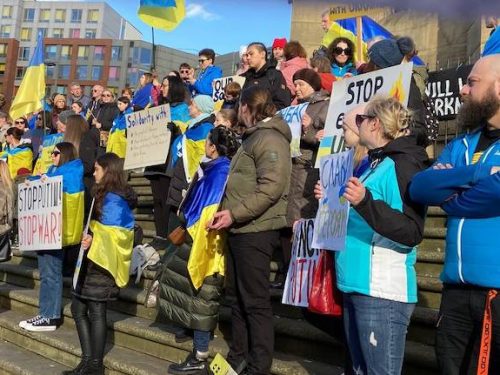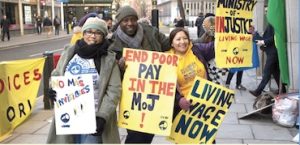face destitution, poor mental health
and barriers to safe abortion
in host countries.
Olena O’Connell and Mariia Goubernik
Olena and Mariia are from Ukraine, they live in the UK
Russia’s war against Ukraine which began in 2014 and became a full-scale assault on the country on the 24th of February 2022 has brought death and destruction on a large scale. Russia has laid waste to cities, villages, and communities across Ukraine, devastating Mariupol, erasing Siverodonetsk, Lyman, and many more. The effects of war have dramatically hurt the employment conditions, increased poverty and created hundreds of thousands of refugees, with social crisis developing in urban centres. Russia’s atrocities against Ukrainian population include killings, rape, torture, deportations, and forcible transfer of civilians to Russia or Russian-occupied areas. To date, the UN has recorded 21,580 civilian casualties in the country: 8,101 killed and 13,479 injured, however the numbers are thought to be much higher. Hundreds of thousands of people have fled their homes, becoming refugees and internally displaced persons. The UNHCR records 8,087,952 refugees from Ukraine across Europe as of 21 February 2023. This amounts to around 20% of the Ukrainian population. 4,863,513 refugees have registered for temporary protection in Europe. Furthermore there are reports of Russian army forces kidnapping Ukrainian women and separating and deporting children to Russia.
Around 90 per cent of refugees fleeing Ukraine are women and children. Most refugees arriving in host countries are women-headed households, single women, adolescent girls, and older women. In the context of war, the risks of gender-based violence and sexual violence against women and girls are heightened. For those on the move, the risks also include trafficking for sexual and labour exploitation. LGBTQI+ refugees and persons with disabilities also face heightened risks of gender-based violence exacerbated by displacement. Indeed, in the early months of the full-scale war, there were reports of women and children refugees being targeted by suspected pimps and sex traffickers operating alone and in gangs. Refugees, in particular women and girls fleeing Ukraine need urgent action to prevent gender-based violence and respond to its life-threatening consequences. There needs to be an emergency response, both in Ukraine and the host countries, who need to provide psychosocial support, safe shelter, legal assistance, and health care. All forms of assistance are particularly important for women and girls who experienced rape and sexual violence.
It is now clear that Russian military is using coordinated, brutal sexual assault against Ukrainian people. There is evidence of systematic campaigns of rape and torture, with rape being used as a tool of war. For some victims, rape results in sexually transmitted infections, unwanted pregnancy, and psychological trauma. Rape victims fleeing Ukraine face difficulties with accessing safe legal abortions in some host countries. In Poland, which currently hosts 1.3 million Ukrainian refugees, legal abortion is almost entirely outlawed. The international community must find a way to provide access to emergency contraception and safe abortion for survivors of sexual violence, both in Ukraine, and for those crossing borders into countries which limit access to or do not allow abortion. It also must ensure that survivors have access to long-term, specialist mental health support which will help them to process these horrific events.
Upon arrival in host countries, many Ukrainian women and children find destitution and homelessness: often the support offered by the host country governments is not adequate and time limited. For example, in the UK women from Ukraine with university degrees, and professional qualifications often find it difficult to get their qualification recognised and accepted. This creates barriers to finding employment, resulting in poverty and exacerbating problems with mental health. Host countries must recognise these issues and ensure the right of Ukrainian and other refugees to access employment, mental health care and other public services and vital social support.





